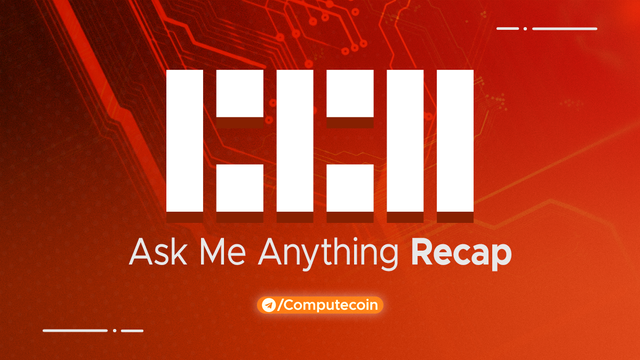
Q1: ComputeCoin has recently begun to focus on the Metaverse. What sort of role, if any, does ComputeCoin see itself playing in Web 3.0? Does ComputeCoin regard Web3.0 as part of the Metaverse?
While a clear definition of Web 3.0 remains elusive, it is helpful to remember that when we talk about Web 3.0, we’re talking largely about blockchains, which are decentralized networks that support the web applications we use daily, power the smart devices that comprise the Internet of Things (IoT). Basically, Web 3.0 is the future of the internet, a new vision of connectivity founded on decentralization and a uniquely 21st-century infrastructure.
The metaverse is also frequently described as the “future of the internet.” However, unlike Web 3.0, which is strongly associated with decentralization, the metaverse is not necessarily decentralized. Today’s metaverse projects--like Facebook Horizon, Fortnite and Roblox--are built on decentralized data centers or on the cloud. Besides, I think the metaverse paints a more expansive picture than Web 3.0, because the metaverse represents not just a new standard in internet technology, but the brave new digital world that we will actually live in.
ComputeCoin will be a self-evolving computer that serves the metaverse. It will aggregate the decentralized cloud to help everyone access and use computing power in the easiest, most affordable, and most accessible way yet. ComputeCoin will also dynamically self-configure and self-organize local mesh networks to help end-users supplement their local compute (for example, using iPhone or Facebook Oculus) while minimizing network-based latency and network-congestion risk.
Furthermore, ComputeCoin will enable algorithms in our platform to self-evolve, paving the way for consistent improvements in user experience.
I’d say ComputeCoin is definitely part of the Web 3.0 revolution; beyond that, we’ve specifically designed the platform to foster the creation of a decentralized metaverse.
Q2: Will we one day see NFTs being used in the ComputeCoin network?
The network will support NFT storage.
Q3: There has been growing interest in video game live streaming services, whereby high-end devices process games and stream the content to users’ screens at home. Has ComputeCoin thought about entering that market?
ComputeCoin will aid developers and startup teams in building metaverse applications, so we absolutely welcome developers to build gaming and/or streaming services on our platform.
Q4: What would ComputeCoin do if, hypothetically, they reached max capacity of idle computers?
If that were to happen, it would be time to celebrate, because it would mean that our ecosystem is really booming, that we have been helping keep a lot of applications online, and that huge numbers of people around the world are enjoying metaverse experiences powered by ComputeCoin.
All jokes aside, our miners including crypto miners, data centers, and all other decentralized networks will provide the bulk of computing resources. Therefore, it is most likely very difficult to reach max capacity. On top of that, we have a robust reward and mining mechanism, which we believe will incentivize more miners (who are not idle) to join us, to the benefit of all associated networks.
Q5: Lately, there’s been some buzz around cloud mining services. On ComputeCoin, will users be able to rent out their computer hardware to people looking to mine cryptocurrencies?
Yes. We will be providing more information on how mining works on our Medium account. Please follow us on Twitter and Medium to get the latest information!
Q6: We are all excited about the mainnet launch next year. Until then, though, will the testnet be open to public testers?
Yes.
Q7: What do you think would be more profitable: If all idle computers mined cryptocurrencies, or if all idle computers provided cloud computing services?
In most cases, providing cloud computing services earns much more. But there may not be sufficient computing services assigned to the host computers at every moment. If so, the computers can mine cryptocurrencies. By doing so, 24/7 earning is guaranteed.
Q8: Renewable energy and reducing carbon emissions are essential to combating climate change. How much energy, and what type or types of energy does ComputeCoin believe its network will require to run smoothly?
Rather than necessitate new data centers, our solution will offer an effective, alternative means to optimizing, utilizing, and maximizing the huge amount of computing power required to support metaverse applications.
Besides, the way a decentralized network works is more efficient, and eco-friendly compared with centralized solutions.
Q9: There are probably a lot of last-gen video game consoles, such as the Xbox One or PlayStation 4, sitting idle as the next generation of video game consoles has come out; has ComputeCoin ever thought of capitalizing on this opportunity by releasing software that can put those consoles to work?
Since these consoles are highly customized to specific uses, it is not easy to integrate them into CCN for general purpose applications. But we are open to all opportunities as we move forward.
Q10: Are there any networks that the ComputeCoin Network is interoperable with?
Miners will be able to mine ETH, FIL, ICP, and our native token CCN simultaneously once we launch our testnet in late September.
We have established strategic partnerships with Swarm and Stem Networks for our distributed computing network. We will also be aggregating other networks, like IPFS, the Internet Computer, and major data centers.